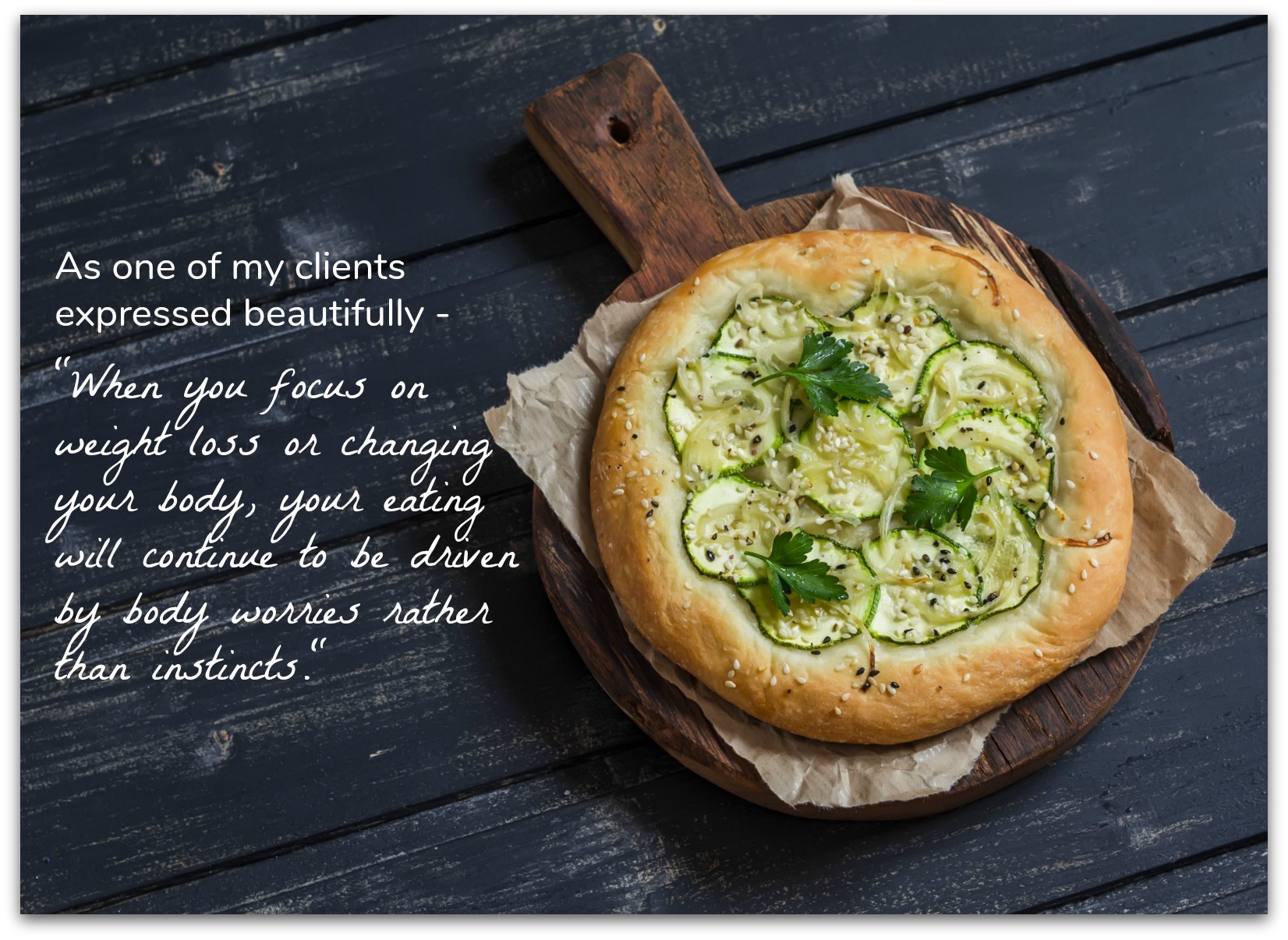Are you struggling with Intuitive Eating or feeling it doesn’t work for you?

Intuitive Eating is becoming ever more popular with an increasing number and variety of health and fitness professionals using the concepts of intuitive eating with their clients. There are now numerous books that support the concept and most appear to hold true to original book, ‘Intuitive Eating’ by Evelyn Tribole and Elyse Resch – a book I highly recommend reading.
While this should be a wonderful thing, unfortunately the concepts and process of intuitive eating are not always being taught or used effectively. Recently, I have had a number of people contact me for help – after trying the process through reading one of the books – saying “it didn’t work for me.” Most often this is because weight loss continued to be a key goal for the individual or there was a promise of weight loss or changing how your body looks. Wanting to lose weight is one of the major sticking points with learning to eat intuitively. It’s not that it’s wrong to want to lose weight (or feel you need to lose weight), it is that focusing on your weight will interfere with the intuitive eating process.
Given the culture we live in, it is completely understandable and ok to want your body to change. The trick is being able to pop these desires on hold while you move through the intuitive eating process. This is one of the toughest aspects of the process and something an experienced dietitian or therapist will help you with. This is a key part of the work we do, click here if you would like help from one of our dietitians.
If, like many people, you are unhappy with your body and you try intuitive eating as a way to change your body, you will likely end up thinking – “Intuitive eating didn’t work for me.” As one of my clients expressed beautifully, when you focus on weight loss or changing your body, your eating will continue to be driven by body worries rather than instincts.
Intuitive Eating Melbourne
So what is the purpose of Intuitive Eating?
Intuitive eating is about learning to trust your body’s cues (instincts) around appetite and food, it is about giving your body the fuel, nourishment and pleasure we all require from food to take care of our mental and physical health. Intuitive eating is also about letting go of food rules and all the “shoulds” and shouldn’ts” our culture imposes on how we are supposed to eat, it requires softening black and white thinking around food and recognising there are no inherently bad foods and that all food can be included in a healthy way of eating. Letting go of all the food rules and changing how you think about food frees up so much mental space and energy and will allow you to feel much calmer around food. In time, you will spend much less time thinking about food or worrying about what you “should or shouldn’t” be eating.
If you’re thinking such freedom with eating will result in you making all the “wrong” food choices and not eating enough of what you “should” be eating, you’re not alone. Many people have this belief when they first encounter intuitive eating partly because we are immersed in a diet culture which teaches us to fear food and that we can’t be trusted around certain foods. When you restrict food, or think you shouldn’t eat it, it’s very normal to go overboard and eat that food in excess whenever you have the chance. This reinforces your belief that you can’t be trusted around that food. What the intuitive eating process teaches you, is that when you start to allow that food in a non-judgemental way and listening to your body’s cues, you can trust your body and not go overboard. It can take some time to reach this point and may even require a period of relearning what your body’s appetite cues feel like, but even if this takes many months (or even a year or so), this is much less time than spending the rest of your life in the restrict-binge-restrict cycle that occurs with dieting or rigid patterns of eating.
If your weight of body shape does change through the intuitive eating process, this is purely a side-effect. However, if you make weight/fat loss the goal, you will struggle to ever trust your body’s natural cues and you will most likely feel intuitive eating didn’t work. It’s not that it didn’t work, you just didn’t give the process the freedom it needs to help you take better care of your health.
